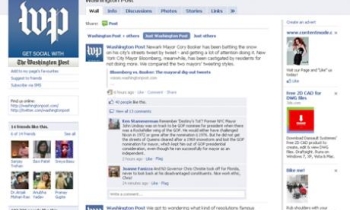Every so often someone asks us why we didn't have a story on such-and-such. "It was all over town, and so-and-so said it was true. He heard it from that other guy, who got it from his aunt, who heard it at coffee in the cafe. Councilman Doe is having an affair with that waitress!"
Often people come to the office with tales like the one above and we check them out-if we can find something or someone solid to go on. More than you'd believe, the stories are groundless, bald-faced rumors, or so garbled in the retelling that when brought to ground they are simply not true.
They don't make the page because we don't print rumors, innuendoes, or out-and-out lies as a matter of course. That is the problem today for our mainstream media. We're now expected to practice tabloid journalism, having no respect for facts or utilizing any of the formerly normal checks and balances to avoid libel and slander. Why? In a word: blogging.
Blogging is relatively new phenomenon of the World Wide Web, a mixture of "news," personal journaling, and just plain blather, often with no regard for the truth. Blogs definitely should come with the caveat, "Let the buyer beware." In this case, the reader should beware-of anything a blogger states as fact.
As witnessed by the Dan Rather debacle on CBS or the several embarrassing factual faux pas in the Washington Post or the New York Times et al, the mainstream press makes plenty of mistakes. We work hard not to do so, and we all maintain policies designed to minimize errors and to guard against the perpetration of libel or slander.
Bloggers and their fans never worry about those constraints. There is a glorious freedom in their ability to simply "publish" whatever they please with no regard for accuracy or whether their diatribes cause pain and suffering. We of the mainstream media do not have that luxury.
While we work within the First Amendment rights to a free press, our feet are held to the fire by libel laws and the lawyers who rightly apply them to our work. Bloggers-so far-seem to be unfettered by such considerations.
The trouble is, among the Internet crowd, i.e. the demographic we mainstreamers have the most trouble reaching (18 to 49), blogs are accepted at face value, widely read and the so-called information they spew spread as fact, whether fact, indeed, really exists.
That presents a tremendous challenge for real journalists everywhere, whether they be of the television, daily newspaper, or weekly paper variety. When readers no longer care about facts or the simple truth, but crave the sensationalistic screeds jamming the web, our job becomes tougher.
Many mainstreamers slip up and find themselves doing the kind of "journalism" bloggers practice with such ease. It gets them in real trouble (witness the fall of Rather, one of the finest journalists of the past 30 years) and is a real danger to the continued protection afforded by the First Amendment, our real freedom of the press. And, freedom of the press, remember, is actually freedom for all of us to speak and write unshackled by government interference.
Please, young folks, do not believe everything you read-especially if it is in a blog. Hold your favorite writer to a standard of truth you'd expect from us.









